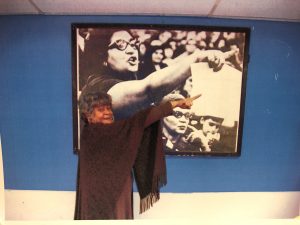By Rachel Klepper
(Part II of II. Read part I.)
Founded in the 1960s by Evelina López Antonetty (1922-1984) as a movement for school reform, United Bronx Parents developed into an important grassroots social-services provider.
Over time, the networks and power that Antonetty built transformed into an organization that provided public health services to Bronx residents and advocated for solutions to issues that residents faced, including substance abuse, hunger, homelessness, and HIV/AIDS. There are many reasons for these shifts, and UBP was certainly impacted by changes to neighborhood needs, local and national politics, and the nonprofit sector. The United Bronx Parents Inc. Records offer the opportunity to look to two internal factors that contributed to these changes: the staffing and management of UBP and its funding sources.

The centrality of UBP’s executive director to its mission is evident in its records. After Antonetty’s death in 1984, her daughter Lorraine Montenegro (1943-2017) was appointed executive director. Having been connected to the organization since its start, Montenegro offered continuity, but also quickly led UBP toward a new public health orientation. Montenegro had received a Masters degree in Human Services from Lincoln University in the 1980s and previously worked for Lincoln Hospital.
Soon after Montenegro’s appointment, UBP received its initial grant for La Casita, a residential program for homeless substance-abusing women and their children. When La Casita officially opened in 1990, it was one of the first places in the country where women could continue to care for their children while receiving treatment for substance abuse. It became the first in a series of UBP facilities offering substance abuse treatment, day care, and HIV/AIDS prevention and services. Montenegro worked closely with the growing staff and oversaw this expansion, as UBP bought new buildings on Prospect Avenue and enlarged its impact on the landscape of the South Bronx.

The other essential factor that directed UBP’s expansion and transformation was the difficulty of finding funding. UBP relied on government and private grants to implement its vision, and consistently faced the challenge of limited funds. Grant applications are the most common type of document in the RBML’s collection. Like other nonprofits, UBP had to write applications that appealed to funders and addressed issues for which grants were available. Many funders were New York City or New York State offices. These offices set regulations and reporting standards with which UBP needed to comply, offered trainings and support, and, accordingly, determined the program areas that received resources to grow. Much of the organization’s daily activity was defined by applying for and complying with grants, while balancing those priorities with their goals and the needs expressed by Bronx residents.

Throughout UBP’s history, a commitment to serving the South Bronx and remaining attuned to residents’ needs and visions characterized its work. It continued to assert its Puerto Rican identity, in fighting for its clients and as part of its institutional culture. UBP’s transformation also raises questions about the ways in which activists, nonprofits, and government agencies interacted and negotiated as they worked for social change in New York City. The changes over time were the result of internal and external factors, that will hopefully be explored by scholarship using this collection. UBP’s history and legacy adds to our understanding of the HIV/AIDS epidemic, drug policies and treatment practices, and school segregation and education reform.

The Rare Book and Manuscript Library’s newly processed United Bronx Parents, Inc. Records includes these stories of the Bronx, the New York City Puerto Rican community, activism, and the fight for community based social services from the 1960s – 2010s. With a focus on the most recent three decades of UBPs’ work, the collection offers insight into the changes this local organization underwent over time, as it was influenced by the people, setting, and funding opportunities that made its work possible.
* * *
Rachel Klepper is a Ph.D. student at Teachers College studying History and Education.